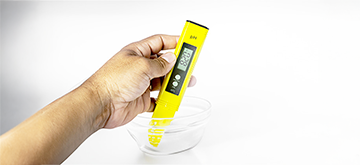
Effects of High TDS on Health and Home Appliances
PUBLISHED ON: 27-Mar-2024
Have you ever wondered why your water tastes odd, leaves stains on utensils, or causes your appliances to wear out faster? The answer often lies in a little-known but crucial factor: TDS, or Total Dissolved Solids. These microscopic particles may be invisible, but their impact on your health, your home, and your daily life is significant. Whether you use municipal supply, borewell, or tanker water, understanding the effects of high TDS helps you ensure better safety and protect your household systems and health.
TDS in water doesn’t just impact what you drink, it can also cause damage to appliances and plumbing systems, especially when it leads to hardness. In this blog, we’ll explore both aspects.
What are the Effects of High or Low TDS on Health?
High TDS in water raises significant health concerns.
- Increased Risk of Chronic Illnesses - It can contribute to kidney stones, heart disease, diabetes, and gastrointestinal issues such as stomach pain and diarrhea.
- Toxic Exposure from Heavy Metals - Elevated levels of heavy metals like lead, arsenic, or nitrate can be toxic and lead to long-term health risks.
- Skin and Hair Concerns - High TDS levels, especially with excess calcium or magnesium, can cause dry skin, hair loss, and scalp irritation.
- Unpleasant Taste and Dehydration Risk - Very high or very low TDS can result in an unpleasant taste, leading to reduced water consumption and potential dehydration over time.
In contrast, having a very low TDS level (50 to 250 ppm) is also detrimental to health. That’s because not all dissolved solids are unhealthy. Minerals like magnesium and calcium are beneficial for your health and well-being. Therefore, adopting a balanced approach to filtering TDS from your water is important.
The ideal solution is a water purifier that appropriately reduces harmful contaminants while retaining vital minerals like calcium and magnesium. Instead of stripping water of all its dissolved content, a well-designed system will selectively remove harmful contaminants, such as lead, arsenic, nitrates, and heavy metals, while preserving essential minerals like calcium and magnesium. These minerals support everything from bone health to metabolic functions and should remain in your drinking water.
By maintaining this balance, the water purifier ensures that every sip is not only free from toxic substances but also enriched with nutrients your body needs.
What are the Effects of High TDS on Home Appliances?
Beyond drinking, TDS-rich water can negatively affect your appliances, plumbing, and cleaning tasks:
- Geysers and water heaters – Limescale buildup reduces efficiency.
- Washing machines and dishwashers – Mineral residue can block pipes and reduce cleaning effectiveness.
- Coffee makers, kettles, and irons – White residue builds up quickly and damages heating elements.
- Pipes and plumbing – Mineral clogging and corrosion increase maintenance needs.
To deal with this, opt for a water softener. Water softeners effectively reduce hardness by removing excess calcium and magnesium, which are key contributors to limescale. This helps protect appliances like geysers, washing machines, and kettles from scale buildup, enhances cleaning efficiency, and extends the lifespan of plumbing systems. Installing a water softener ensures smoother appliance performance, lower maintenance, and better water quality throughout your home.
Conclusion
Though measuring your water’s TDS is the first step to safer, better-tasting water, you must also know that TDS is not the sole indicator of water purity. Water may contain various other contaminants such as mud, dust, rust, sand, bacteria, viruses, and heavy metals like lead and arsenic. To ensure that the water at your home has balanced TDS levels, is free of contaminants, and retains essential minerals, it is important to install the right water purifier or a water softener.
Frequently Asked Questions
What is TDS in water?
TDS (Total Dissolved Solids) refers to the concentration of dissolved minerals, salts, and organic matter in water, measured in mg/l or ppm. High TDS can affect taste, health, and electric appliances’ lifespan. Read more
How does high TDS affect health and home appliances?
High TDS can lead to health issues like kidney stones, digestive problems, and dehydration. It also causes scaling in appliances, reducing their efficiency and lifespan. An RO water purifier helps reduce excess TDS and protect both your health and appliances.
How can I reduce high TDS in water?
The most effective way to lower high TDS is by using an advanced water purifier like Aquaguard RO+UV systems. These purifiers remove harmful substances while retaining essential minerals, delivering safe and clean water for daily use.
